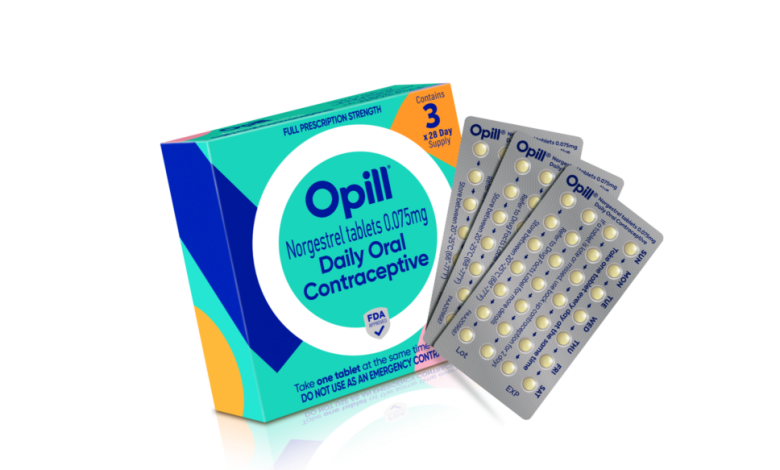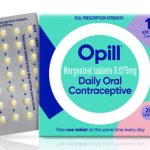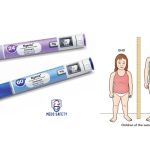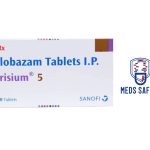Opill: Uses, Benefits, How to Use, Side Effects, Warnings, Availability

Opill (norgestrel) is the first ever over the counter birth control pill available in the United States. It was recently approved by The U.S. Food and Drug Administration (FDA) for over-the-counter (OTC) use for all ages. The FDA granted the approval to Laboratoire HRA Pharma, recently acquired by Perrigo Company plc.
It is essential to note that Opill is not intended for use as emergency contraception and should not be relied upon as a method of preventing pregnancy after unprotected sexual intercourse. Furthermore, it is important to recognize that while Opill is effective in preventing unintended pregnancies, it does not offer protection against the transmission of sexually transmitted diseases (STDs) such as HIV, AIDS, chlamydia, genital herpes, genital warts, gonorrhea, hepatitis B, and syphilis. To safeguard against the risk of contracting STDs, the consistent use of condoms is strongly recommended.
Each tablet of Opill contains 0.075 mg of norgestrel as the active ingredient in 28-day calendar packs.
How Opill works
Norgestrel, the active ingredient in Opill, is a progestin hormone. Progestins are synthetic hormones that mimic the effects of the naturally occurring hormone progesterone in the body. Norgestrel works primarily by inhibiting ovulation, which is the release of an egg from the ovaries during the menstrual cycle.
By taking Opill consistently and as directed, the levels of norgestrel in the body are maintained at a steady level. This helps to suppress the release of luteinizing hormone (LH) from the pituitary gland. Without the surge in LH, ovulation does not occur, and an egg is not released from the ovaries.
In addition to inhibiting ovulation, norgestrel also thickens the cervical mucus, making it more difficult for sperm to enter the uterus and reach the egg. This creates a barrier that further reduces the chances of fertilization.
Furthermore, norgestrel affects the lining of the uterus, known as the endometrium. It makes the endometrium less receptive to the implantation of a fertilized egg, should fertilization occur. However, it does not provide protection against the various infections and diseases that can be transmitted through sexual contact.
How to use Opill
Opill should be taken at the same time every day; adherence to daily use at the same time of day is important for the effectiveness of Opill. Using medications that interact with Opill can result in decreased efficacy of Opill or the other medication, or both, potentially resulting in unintended pregnancy.
The recommended dosage of Opill is one tablet taken orally at the same time every day. It is important to maintain a consistent daily dosing schedule without any interruptions between pill packs.
If a pill is missed, the patient should refer to the specific instructions provided for missed pills and follow the recommended course of action. Additionally, it is advisable to use backup contraceptive methods, such as condoms, when necessary according to the guidance provided.
When initiating the use of norgestrel, the first pack can be started on any day. However, if switching from another oral contraceptive, vaginal ring, or patch, it is recommended to begin taking Opill on the day after stopping the previous method. During the first two days of starting Opill or switching from another contraceptive method, it is advisable to use a condom or another barrier method for each instance of sexual intercourse.
By adhering to the provided dosage instructions and following the prescribed guidelines, Opill can be an effective contraceptive option to help prevent unintended pregnancies.
To ensure comprehensive protection, it is advisable to combine the use of Opill with barrier methods such as condoms, which offer dual protection against both unintended pregnancies and STDs. This approach promotes responsible and informed sexual health practices that prioritize both contraception and disease prevention.
Benefits
Opill offers several benefits as an over-the-counter daily oral contraceptive:
1. Increased Access: With Opill being available over the counter, it enhances access to contraception for a wider population. This increased accessibility allows individuals to obtain contraceptives without needing a prescription, reducing potential barriers to obtaining birth control.
2. Convenience: Opill provides a convenient contraceptive option, as it is taken orally once a day at the same time. The ability to purchase Opill at drug stores, convenience stores, and grocery stores makes it easier for individuals to consistently obtain and use contraception.
3. Efficacy: When used as directed, Opill is an effective method of contraception, with high rates of preventing unintended pregnancies. Following the recommended dosage and adhering to a consistent daily regimen can contribute to the effectiveness of the contraceptive.
4. Safety: Opill has been approved by the FDA, indicating that it has undergone rigorous evaluation and meets safety standards for over-the-counter use. As with any medication, it is important to follow the instructions and consult a healthcare provider if any concerns arise.
5. Support from Medical Organizations: Opill has garnered support from medical organizations such as the American Medical Association, the American Academy of Family Physicians, and the American College of Obstetricians and Gynecologists (ACOG). Their endorsement of over-the-counter access to hormonal contraception without age restrictions further highlights the benefits and importance of increased accessibility.
6. Autonomy and Privacy: By having access to Opill without a prescription, individuals have greater autonomy and control over their reproductive health decisions. They can make choices regarding contraception privately and confidentially, empowering them to take charge of their own reproductive well-being.
It is important for individuals to consult their healthcare provider or pharmacist for personalized advice and guidance on contraceptive options, including Opill. They can provide information specific to each individual’s health history, considerations, and needs.
Side Effects of Opill
Opill may be associated with certain side effects, although they may vary in frequency and severity among individuals. The most commonly reported side effects include:
1. Irregular Bleeding: Some users may experience changes in their vaginal bleeding patterns while taking Opill. This can manifest as irregular spotting or prolonged bleeding. It is important to note that these changes do not necessarily indicate a health concern, but individuals should reach out to their healthcare provider if they experience repeated vaginal bleeding after sexual intercourse or prolonged episodes of bleeding.
2. Headaches: Headaches are another potential side effect of Opill. While they are generally mild, some individuals may experience moderate or severe headaches. If headaches become persistent or severe, it is recommended to consult with a healthcare professional.
3. Dizziness: Some users may experience episodes of dizziness while taking Opill. If dizziness persists or becomes severe, medical advice should be sought.
4. Nausea: Opill can cause feelings of nausea in some individuals. If nausea becomes persistent or severe, it is advisable to consult a healthcare provider.
5. Increased Appetite: Some users may experience an increase in appetite while taking Opill. It is important to be mindful of dietary choices and engage in healthy eating habits.
6. Abdominal Pain, Cramps, or Bloating: Opill can sometimes lead to abdominal discomfort, including pain, cramps, or bloating. If these symptoms become severe or persistent, medical guidance should be sought.
It is crucial for individuals using Opill to be aware of potential changes in their menstrual patterns. If two periods are missed, or if a single period is missed and doses of Opill have been skipped, it is advisable to take a pregnancy test. If pregnancy is confirmed, Opill should be discontinued.
Overall, while Opill is generally well-tolerated, it is essential to monitor any side effects and promptly consult with a healthcare provider if concerns arise. Healthcare professionals can provide personalized guidance and address any specific concerns regarding the use of Opill.
Who should not use Opill?
Opill (norgestrel) is contraindicated in certain individuals, and it is important to consider the following conditions and situations:
1. Breast Cancer: Opill should not be used by individuals who have a current diagnosis of breast cancer or have had breast cancer in the past.
2. Other Forms of Cancer: Individuals with other types of cancer should consult with their healthcare provider before using Opill. It is important to discuss the potential risks and benefits in their specific case.
3. Concurrent Use of Hormonal Birth Control: Opill should not be used simultaneously with other hormonal birth control products, such as another oral contraceptive tablet, a vaginal ring, a contraceptive patch, a contraceptive implant, a contraceptive injection, or an intra-uterine device (IUD). Using multiple hormonal contraceptives simultaneously can increase the risk of adverse effects and complications.
It is important to note that these contraindications are general guidelines, and individual circumstances may vary. It is always recommended to consult with a healthcare provider or pharmacist to assess the suitability of Opill based on an individual’s medical history, current health status, and any other medications or treatments being used. They can provide personalized advice and guidance regarding the appropriate contraceptive options for each individual.
When will Opill be available?
Opill will be available in-store and online at leading retailers across the U.S. as early as the first quarter of 2024.





